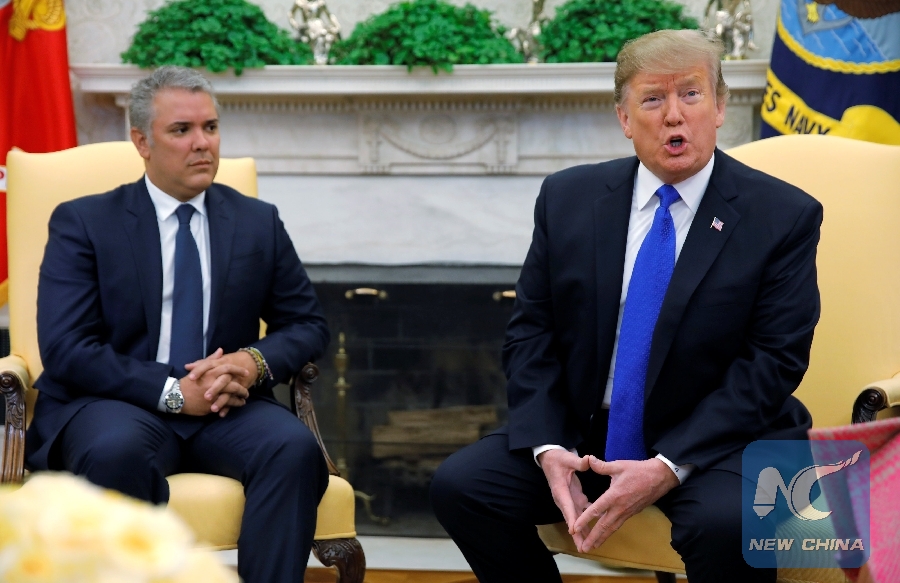
U.S. President Donald Trump talks with reporters as he sits with Colombian President Ivan Duque at the start of a meeting in the Oval Office of the White House in Washington, U.S., Feb. 13, 2019. (Xinhua/REUTERS)
WASHINGTON, Feb. 13 (Xinhua) -- U.S. President Donald Trump and visiting Colombian President Ivan Duque on Wednesday announced their decision to strengthen bilateral relations and highlighted cooperation on the Venezuela issue.
In their joint remarks to the press, Trump called the situation in Venezuela "turmoil," and said Maduro's refusal to accept humanitarian aid is a "terrible mistake."
Trump said his meeting with the Colombian president would be "devoted to discussing Venezuela," while Duque also called on Washington and Bogota to continue working on Venezuela.
Venezuelan President Nicolas Maduro called the Wednesday meeting between Trump and his Colombian counterpart a "feast of hate against Venezuela."
Trump has remained ambiguous about the future policy regarding Venezuela. Asked if he was considering a military solution, Trump said there are "a number of different options. And we look at all options."
U.S. Special Representative for Venezuela Elliott Abrams, however, made it clear the same day during a hearing of the House of Representatives Foreign Affairs Committee that the United States would not be militarily involved in Venezuela.
"When we say the options are on the table (that is) because options are always on the table," said Abrams.
Eliot Engel, the chairman of the House Foreign Affairs Committee, also said on the same occasion that "U.S. military intervention is not an option."
On Tuesday, Russian Foreign Minister Sergei Lavrov warned U.S. Secretary of State Mike Pompeo in a phone conversation that Russia opposed U.S. intervention in the internal affairs of Venezuela, including the use of force.
Lavrov said Russia had prepared a United Nations Security Council draft resolution supporting dialogue in Venezuela, contrary to a U.S. proposal that paves the way for an invasion.
Venezuelan Foreign Minister Jorge Arreaza said Tuesday that the government is ready to sit down with the opposition without preconditions and seek a solution to the political crisis.
On Jan. 23, the Trump administration recognized Venezuelan opposition leader Juan Guaido as the nation's "interim president," a move that came after Maduro was inaugurated as president of the Latin American country earlier that month.
In response to Washington's support for Guaido, Maduro announced he was severing "diplomatic and political" ties with the United States, ordering all the U.S. diplomatic and consular personnel to leave Venezuela in 72 hours.
For years, the United States has imposed diplomatic pressure and economic sanctions against Venezuela. The United States imposed sanctions on Petroleos de Venezuela, a state-owned oil firm in Venezuela, a move of the Trump administration to mount pressure on Maduro to cede power to the opposition.

